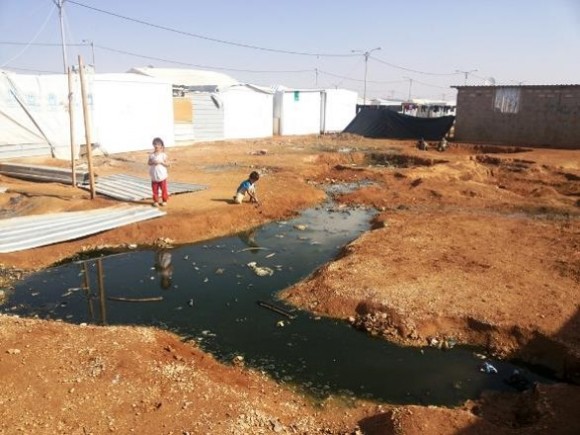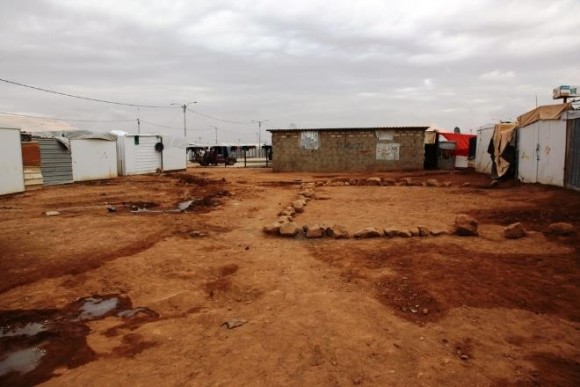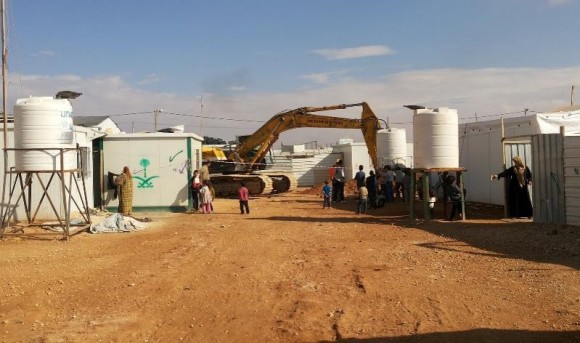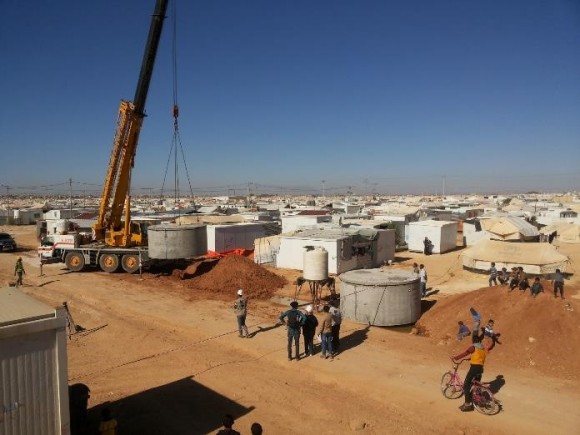A sense of calm reigns over Za’atari camp. The usually hum of heavy machinery has ceased and the construction sites that once invaded neighbourhoods have disappeared. Under the earth now lies 979 septic tanks connected via roughly 98,000 meters of piping to the toilets and showers of some 6,400 houses in the camp.
On March 7th, 2017, ACTED completed installing the last pipes connecting households in ACTED’s district 10 of Za’atari camp to the desludging network. Furthermore, all private institutions and mosques in ACTED’s six districts (1, 2, 9, 10, 11 and 12) were connected to the network. Last May, ACTED completed connections in the five other ACTED districts. The end of current works bring the Za’atari waste water network on step closer to reality.

Started in June 2015 with a small pilot, Za’atari’s wastewater network sought to resolve the sanitation crisis that was looming in the camp. As increasing number of refugees installed private sanitation facilities in their households, effluent, under the form of grey and black water, began to run along the streets and stagnate in unsightly and unsanitary pools. In an attempt to manage the waste, camp residence dug unofficial sewage pits and sewage trenches to drain the waste, but huge health risks remained.
Before there was just grey and black water everywhere. People didn’t know where and how to dump their grey water.
He explains that the wastewater issue increased social tensions between neighbours. “Neighbours would argue about where channels should be dug and didn’t want the bad smelling water to pass next to their house.”

Outbreaks of disease and insect infestations soon became problematic. “There also used to be a big rat problem in the camp, they used to be as big as sheeps,” Sayid explains with a smile. Furthermore, due to poor management there was a high risk that effluents would seep into the water table and potentially contaminate the underground water aquifers, thus increasing the risk of water-borne diseases.
In response, ACTED and UNICEF designed and began installing a wastewater system in the camp. The system connected groups of seven to nine households to communal septic tanks. Although the plan was simple on paper, the team tasked with implementing the project ran into several hurdles.

At the beginning of the project, the people were the biggest challenge.
“They were not really happy with the construction works and the presence of machinery,” he continues. However, people soon saw the benefits of the system being put in place and gladly accommodated the project in their neighbourhoods.
There were also logistical issues, with some locations being extremely overcrowded, leaving little space for heavy machinery to access the worksites. “In response we used smaller equipment,” said Marwan, “the work was slower but ensured that no houses were damaged or had to be moved during the entirety of the project.” Furthermore, some camp residents moved their houses (prefabricated caravans) around the camp, complicating the team’s task of choosing adequate locations to install septic tanks and the connecting pipes.

The wastewater system will continue to be improved. Currently all houses are connected to septic tanks, which means that desludging trucks make the rounds of the camp every day to empty septic tanks. In order to increase the efficiency of the camp’s sanitation system, the next step, as from next year, will be to connect all the septic tanks to a main pipeline that will take all the waste to a treatment plant outside the camp. ACTED will continue providing technical assistance to UNICEF.